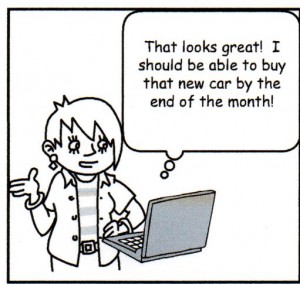Departments
Search
Follow Us
Tags
Latest Highlights
IBH
Facing the Reality of Selling Online
I’ve written about the reality of selling online before, but the message bears repeating. This is the 21st century, and more and more people shop online. Just a few years ago, shopping online was not the norm – you shopped online when you couldn’t find what you wanted locally, in person. But these days, people don’t just shop for something special online; they buy almost everything online. My hope is that what follows reminds us all that to be successful online, you need to acknowledge the realities of creating that success.

Fiction: You list your work for sale online and people will flock to your site to buy it.
Reality: You list your work for sale online and no one will know it’s there.
Think about it seriously… how many products are on the internet? Narrow that infinite number down by wondering how many products similar to yours are on the internet. The number is still huge! When you create a web presence, there are hardly a handful of people who know about it – there’s you and the domain you chose.
Until you do some promotion, no one will ever find you. This is not the venue’s job; it’s yours. For a moment, think of your web location in terms of a physical store, a brick-and-mortar. You rent that space from a landlord. In return for your monthly rent, you would expect the landlord to keep the building in good repair. At no point would you expect the landlord to promote your business – that’s just not what landlords do. Whatever promotion, advertising, or marketing gets done for your business would be part of you running your business and making it successful.
A web site is no different. The owners of the host site may do all kinds of promotion for the site, but none for your part of it specifically.Well you can check the price of a minecraft server. The venue is a business, just like you are, and they are working to build and expand their business (site hosting). Happily, here, the owners choose to market their site by featuring its artisans, but here is the exception to the rule.
For your work to be found, you will spend countless hours promoting and marketing yourself. You will need to blog, tweet, social network, participate in forums/chat rooms, run ads (free or paid) and anything else you can think of. You may do all of these things or only some. You may find other ways to teach people (consumers) that you’re serious and convince them that your item is the one they need out of all the choices available. This work will never, ever be finished. You may hit a point where you think that your sales are okay and that you don’t have to waste so much time any more on promotion. Trust me, you will watch your sales mirror the time spent on marketing. Perhaps the biggest complaint of doing business online is the time required on promotion. It is the necessary evil.

Fiction: Everybody has those. I can make that just as well and I’ll be rich.
Reality: Everybody has those. You’re too late.
By the time you notice that there’s a “new thing,” it’s often too late to get in on it. You’re competing with an established and known item, sometimes by a particular maker. Your version may be seen as a “knock off.” By the time you create an item in the same category with a twist to make it different, the demand has already peaked and most everyone who wanted one already has it. Remember that by the time you hear about it, it’s been around for a while. Consumer trends are short-lived and people are so fickle!
Fiction: My work is so wonderful and unique, it will sell itself.
Reality: Your description of your work is what will sell it.
A fabulous item with great pictures and little or no description will languish unsold. Online shoppers need information before they will part with their hard-earned money. What are the measurements? How much does it weigh? How do I take care of it? What is it good for? Why do I need it? Your description should cover all of the nuts and bolts of the item. And if you can write your description in a conversational style, without overdoing it, all the better!

Fiction: I’m an artist.
Reality: I’m an advertising agency, a promoter, a warehouse, an auditor, a bookkeeper, an event planner, a secretary, a budget analyst, a copy editor, an SEO expert, and a tax filer – in my spare time, I’m an artist.
Talk to anyone with a successful online shop, and they will all tell you that they don’t have enough time to create – to do what they love. Some of the really successful ones don’t even work on the physical items anymore, having handed off the assembly process to hired workers. The hardest thing to acknowledge, for me anyway, is that to maintain an online business in the arts, the last thing on the list of things to do will be the art itself. All the marketing, accounting, budgeting and planning will come first, because if these things aren’t done, there will be no reason to create that next item/piece. I can help you with your special event, I can get providers,

Fiction: I’m doing this so I can quit my day job.
Reality: You will never quit your day job.
If you become successful enough to stop working for someone else and work only for yourself, you will put in more hours per day than you ever did on someone else’s payroll. You will exist only to pursue your own business. You will never “go home for the day.” You will be on duty 24/7/365. And the more successful you become, the more hours you will put in. There may come a time when you wish you still had that day job! But if you still have your job and you become aware of an issue at your workplace, you should contact the legal experts HKM.

Fiction: Sales will start pouring in right away.
Reality: There is no guarantee when or if you will sell anything.
Sales may happen right off the bat. Sales may be non-existent, then all of a sudden there will be a bunch, then nothing again. Sales may be hit-and-miss. Predicting the future is never an exact science. In the old days, there was a rule that, when starting a business, you should have enough capital to keep it running for a year without a single sale. This is still a valid starting point. It will take some time to measure the viability of your endeavor, to predict whether or not it will be a sustainable success.

Fiction: My work is so wonderful and unique that any old picture will do.
Reality: You will need to be the Ansel Adams of handmade to sell your work online.
The competition is stiff, to say the least. In the real world, people can use all of their senses to fall in love with your work. Not so in cyberspace. The only thing that will get a potential customer to even bother to read your description, let alone buy the item, is the pictures. It’s not unusual to hear successful artisans and craftsmen claim that they take fifty or more pictures to hopefully get four or five they can use. As time goes on, you do get comfortable with not just staging your work, but with lighting and equipment. This too is a necessary evil.
Fiction: All I need is one really good idea, and that will make me successful.
Reality: In music, they call this a “one hit wonder.”
You start with a really good idea, and watch it evolve and grow or peak and fade. Branching out is a good thing and necessary to a successful business. That great idea may be cyclical, seasonal, and its time may come and go. You don’t want to find yourself stranded with nothing to fall back on. You’ll find yourself always working on the next great thing or reworking something that isn’t working. Think of it as “keeping up with the times.”

Fiction: Someone who thinks they can make it in the arts is just setting themselves up for disappointment.
Reality: Someone who thinks they can make it in the arts is just setting themselves up for disappoint if they don’t understand what they’re getting themselves into.
It can be done… honest! The first thing to consider is your definition of success. That definition is going to be unique to each person. With planning, studying the market, a solid promotional strategy, a good understanding of the true cost of your work, and the drive to see it through, handmade artisans can be and are successful. The thing that seems to be a constant of those artisans who claim to be successful is that they truly want it. They are willing to give it the time and attention it takes to achieve their perceived level of success. They are paying attention to the past and present and applying what they are continually learning to the future.
****
This isn’t a quick and easy road to follow, but the rewards down the line are worth it. I can think of nothing better than that sense of self-satisfaction on the days when you can grin and think to yourself, “I did it!” I would love to see your own “Fiction and Reality” in the comments section below.
Tags: buy handmade, cyber business, Handmade, handmade business, selling online, selling tips, small business
Posted in Handmade, Handmade Artisans, Handmade Mode, Information, Promote Handmade, Selling Tips
4 Responses to “Facing the Reality of Selling Online”
Leave a Reply
You must be logged in to post a comment.


Great article! Thanks…. I see a lot of me in it. But….. as an 80 year old, not very talented gramma I can say that I am just making tracks as I walk through the earth. I just want people to know I’ve been here and I am having a ball.
Yes, yes, yes, and yes! You’ve got it pegged. I’ve been in business since 2003, and by my standards I’m very successful. I don’t earn enough to support myself, but I provide a significant supplement to my family’s income, I enjoy what I’m doing, and I have lots of very happy customers.
The biggest thing I learned was that to succeed, I had to be flexible. I had to start creating the items my customers asked for — even if they weren’t the items I originally planned to make.
Well put Sandi, I will say that we have worked for well over a decade and still struggle to be relevant. You have to love what you’re doing or else it will not work!
… and be INCREDIBLY stubborn!